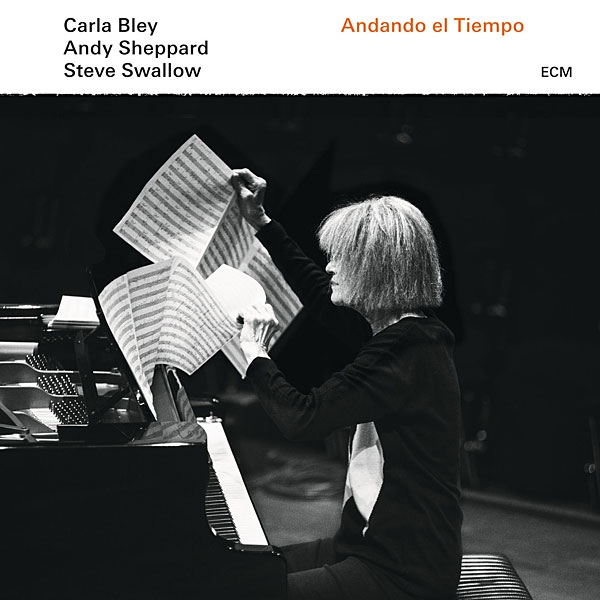| Columns Retired Columns & Blogs |
Thanks! for sharing- JS.

Resistance is futile. From the moment she dropped out of high school in Oakland, California and headed for New York, nothing was going to stop Karen Borg, the daughter of a church organist, from evolving into one of the most influential jazz composers of her generation in her new identity as Carla Bley. While working as a hat-check girl at Birdland, she met the brilliant avant-garde pianist Paul Bley (1932–2016), married him in 1957, and kept the surname when, in 1964, they divorced. She began composing during that period, transforming the music she'd learned from her father into a jazz language rooted in the numinous depths of devotional music, but capable of the free expression absorbed from compatriots of her husband such as Ornette Coleman and Charles Mingus.
And absorb she did. Carla Bley's celestial compositions convert her collaborators from the inner spirit out, leaving few telltale marks on the surface but infusing the soul of their art.
Bley describes her method as a gradual assimilation, likening herself to a "slow sponge." Her collaborators tend to feel that inexorable flow. In 1958, she contributed a track to Paul Bley's third album, Solemn Meditation, as Carla Borg. Paul's 1963 release, Footloose!, included five Carla Bley compositions, and its follow-up, Barrage, was entirely written by her. Even after their marriage ended, Paul continued to be taken with by Carla's writing. He performed three of her compositions on his groundbreaking 1973 solo album Open, to Love, one of the recordings that codified the aesthetic of Manfred Eicher's productions for his label, Editions of Contemporary Music, aka ECM.
Carla Bley continued to encompass myriad influences and collaborators. During her marriage (1967–1992) to composer and trumpet player Michael Mantler, she became one of the most iconoclastic figures in jazz, writing the groundbreaking, long-form A Genuine Tong Funeral, recorded by Gary Burton; helping Charlie Haden launch his classic Liberation Music Orchestra; and producing her monumental "chronotransduction," Escalator Over the Hill. That historic recording was released on the couple's label, JCOA, the initials of their creative organization the Jazz Composer's Orchestra Association.
Bley and Mantler launched their own record company, WATT, with Bley's classic Tropic Appetites (1978). They formed their own independent music-distribution service. Bley and Mantler continued to release their recordings on WATT, while Bley contributed to producer Hal Willner's imaginative recastings of works by Nino Rota, Thelonious Monk, and Kurt Weill, and to numerous other projects. She began writing for the bassist she worked with, Steve Swallow in the 1980s, performing and recording a series of duets with him. Later, Swallow became her third husband. They have now been partners for more than 20 years.
Over the years, Bley has continued to write for and lead bands of various formats, ranging from large bands to solos, duos, and trios; after Haden's death, she eventually led the Liberation Music Orchestra. Her duo project with Swallow became a trio with the addition of saxophonist Andy Sheppard. Bley's music became increasingly meditative, and in 2013—40 years after contributing to her first husband's ECM masterpiece, Open, to Love—Bley turned over production duties to Manfred Eicher and recorded a selection of her own compositions under Eicher's supervision. That album, Trios, adheres to Bley's vision in that the ideas frame the structures, offering opportunities for her collaborators to shine. Her interaction with Swallow and Sheppard is as prescient as a hive mind.
Andando el Tiempo is all new material, highlighted by one of Bley's now-characteristic longer works, the three-part title suite. Bley wrote the suite, which depicts the three stages of recovery from addiction, for a friend she watched go through the process. Her funereal piano introduction opens part 1, "Sin Fin," followed by Sheppard's mournful tenor before Swallow enters softly on electric bass, Bley reentering with a hypnotic four-note figure. Then Bley takes the lead, accompanied by Swallow. Sheppard takes another pass, lingering on each note, almost Stan Getz–like. His solo is punctuated by cries that add to the narrative drama of the piece, with a climb to the finale that works programmatically into the theme.
Sheppard's theme carries over into part 2, "Potación de Guaya," atop a bolero-like framework from Bley and Swallow, who emerge from this reverie in a taffy pull of a duet, each note momentarily hanging in place. This movement represents "the ongoing sorrow felt by everyone affected," as Bley writes in her liner note, the emotion magnificently expressed in thoughtful passages from Swallow on bass and Sheppard on soprano saxophone.
Part 3, "Camino al Volver," resolves to a happy ending epitomized by Swallow's joyous bass patterns, which provide a springboard for the trio to dance their way out. In "Saints Alive!," Bley's penchant for whimsy breaks the mood with a languid evocation of a front-porch conversation between her and Swallow in the cool of the evening.
The trio closes with the classically influenced "Naked Bridges/Diving Brides," written "as wedding present for Andy Sheppard and his new bride, Sara."—John Swenson


thanks so much, John, your review is certainly one of the most thorough and best-informed pieces I've come across lately.
Great album.